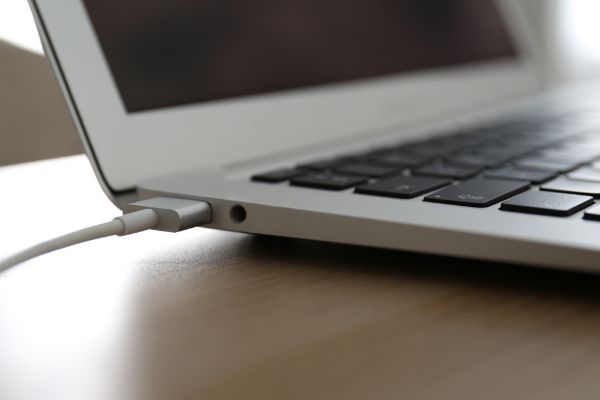Disclaimer: This post may contain affiliate links, meaning we get a small commission if you make a purchase through our links, at no cost to you. For more information, please visit our Disclaimer Page.
The portability of laptops is one of their main selling points over traditional desktops. While many people prefer to have a desktop rig at home, they might need a laptop in order to take care of business away from home, have access to things on a trip, or provide entertainment needs at gatherings that take place outside of the home. Whatever the case, it is the battery in the laptop that allows it to keep a charge while it is in use elsewhere and away from power.
Some people might wonder about the types of chargers that the laptops use. In most cases, a new laptop is going to come with a power cord of its own, but there are occasions where you might need to get a charger for keeping the battery going when you’re out.
We can talk about whether it is possible for a laptop to break a charger, how a bad charger might affect a laptop, and what sorts of things might cause a laptop charger to stop working. We’ll also touch on some of the different types of chargers you might find on the market.
Table of Contents
Can a Laptop Break a Charger?
It is possible for a laptop to damage a charger. However, the circumstances are usually both quite specific and rather remote. It might be more common for a faulty charger to damage the laptop, but we’ll get to that in a later section.
When we talk about breaking the charger in this context, we’re assuming that the laptop itself runs fine, but the charger shows no plugged in, charging status when you connect it to the device. Further, we’re making the assumption that the laptop is the culprit here.
If the battery in your laptop is damaged or bad, this could create problems for the charger. As long as the charger is regulated for your specific device, this should be a rare occurrence.
The reason it is rare is due to the safety features that are inherent in many of the chargers you’ll find today. However, we should take a moment to address the battery situation.
Even if your charger can deal with charging a bad or defective battery, it can be hazardous or downright dangerous to continue using said battery in the laptop. Smoke, fire, or other sorts of things that could damage more than just the battery might occur. If you think the battery is bad, replace it as soon as you can.
The reason it should be rare for a laptop to break a charger has to do with these devices being switch-mode units that regulate how much current passes through the systems and to the battery. In theory, a good charger with safety features such as current-mode control or feedback loops should be able to sense when it is pumping energy into a laptop battery that is no good.
Once it does, it should be able to stop doing this before any significant damage occurs. Exceptions do exist, though, and this is why we recommend getting the battery replaced if you think it is faulty. Here’s a link to an article we wrote on some alternatives to charging a laptop if you do not have a working laptop charger.
Can a Bad Charger Ruin a Laptop?
As we mentioned, bad chargers can have an adverse effect on laptops. However, it depends on how we define “bad” in this context. If the charger is simply broken to the point that nothing seems to be going through it and to the laptop, it is likely that nothing will happen.
Looking at battery levels over time should tell you if the charger is not functioning properly. In order to eliminate the possibility of the problem having something to do with the laptop or its ports, you may wish to grab a spare charger and test it out.
A damaged charger might work but send the wrong current through to the laptop. This can be dangerous to the unit, and it could lead to catastrophic failures of some of the hardware inside.
Your laptop expects a particular voltage when it is plugged into a charger. The charger that your manufacturer recommends is rated for the voltage range that is supposed to work with the computer.
Damage to the charger could cause it to start behaving erratically. It may quit working altogether, but it may send the wrong voltage to the laptop, too. This is why it is important to inspect your charger if you think there is a problem. Again, testing with a spare is good for eliminating laptop issues, too. Check around the ports to see if there is any noticeable issue.
Are Universal Chargers Bad for Laptops?
You may have noticed that your laptop can’t be charged like your phone can. In the case of your smartphone, you can often ask to borrow a friend’s cord to charge your device. The same isn’t necessarily true of laptops.
Not all of these devices are created equal, and different manufacturers make various specifications in their computers. These specifications require different charging standards. Therefore, it is not always a good idea to just swap chargers for laptops.
Why can’t you do this like you can with phones? For the most part, it is because, although USB is a common charging standard for mobile devices now, its primary purpose is as a data transfer standard.
Since many developers knew they would need this standard to allow users to transfer files already, it also became a way that consumers could charge those same devices. The power needs of laptops can differ wildly from one model to the next, so this sort of thing didn’t happen with them.
However, something called a universal charger has hit the market, and it is important to talk about what it can or cannot do for your laptop. The term “universal” is a bit of a misnomer here.
At its core, it is an AC power adapter that you might find with any laptop, but it has had some tweaks or fixes in order to make it compatible with more than one type of computer. That doesn’t necessarily mean that it is truly universal, but it is designed to allow people to use the same cord for different laptops.
Can you use one of these chargers safely? It depends on the level of risk to your system that you want to take. Some of these chargers are tested with multiple models in mind. Even so, there is not a complete guarantee that using one might not do some damage to your laptop.
If you do decide to try one, you have to be sure that the voltage, tip type, and polarity match the specs recommended for your original charger. Universal chargers aren’t necessarily terrible, but you should really know what you’re getting into and how to get one that you know will work. If at all possible, try to get an original replacement for your defective charger.
Can I Use an Off-Brand Laptop Charger?
While it is possible that an off-brand charger could work with your laptop, deciding to use it comes with some risks. Some off-brand chargers can come from reputable companies that you might see recommended by others in the tech community.
However, many such devices might come from other places that use very cheap, possibly substandard parts. This means the parts may not last long. Even if they do, they might cause faults or failures that would require you to replace the charger anyway. If it gets bad enough, the units could cause further damage to your laptop.
If you do want to use an off-brand charger, it is a good idea to check to see if it is in any way recommended by your manufacturer. Most laptop manufacturers will want you to seek out OEM replacements for things like chargers. As we touched on, it’s about compatibility, and any part that isn’t explicitly rated to be okay to use with your device could cause some harm to it.
What Can Cause a Laptop Charger To Stop Working? 5 Causes
Sometimes, laptop charges just sort of go out. One day, they stop charging your device. There could be several reasons for this, but we’ll go through a few of the most common ones. We can also touch on how you might eliminate some of these possibilities.
1. Cable damage or the folding of the cable could be causing some kind of interruption. Check the length of the cable to see if it is folded up at any point. An aggressive fold could cause a malfunction that makes it hard for the unit to charge the laptop. Similarly, check for frayed areas along the cable.
2. The charger should have a large power brick along its length. Some of the internal components inside this part of it could have taken damage.
3. The power adapter port on the laptop itself might not be working properly. If this is the case, the charger might be fine, but it cannot deliver the current that the laptop battery needs.
4. Similarly, the pin connectors where the charger connects itself to the laptop might be damaged.
5. There could be blown components somewhere on the motherboard inside the laptop.
Most of these issues will be easy to spot at a glance, although you’ll have to do some digging inside the device to check the motherboard properly.
Conclusion
Laptop chargers expand consumer-grade options for taking computing power with us and giving it a steady flow of the juice that it needs. In most cases, an OEM charger will be the best option for people looking to have something that they know will work and stay safe for their machines at the same time.
Some chargers that are not tested or rated properly could also cause damage to your laptop, and it is important to look out for any signs that there might be trouble.


